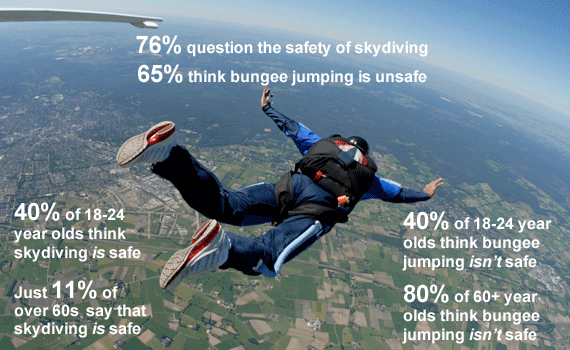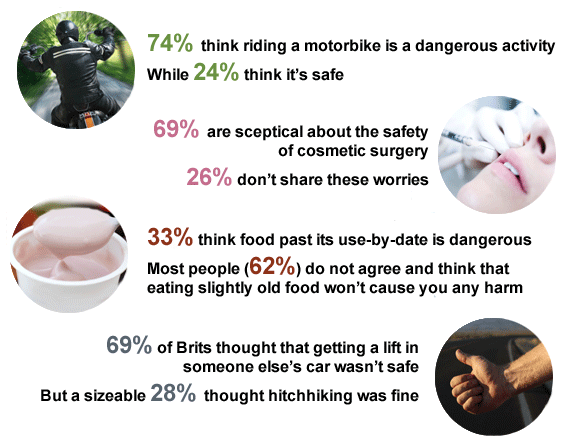Smoking, drink-driving, taking ecstasy and skydiving are among some of the activities Brits perceive as most dangerous, according to our survey, which also found that notable minorities of the population also consider playing rugby, skiing, and eating food past its sell-by date is ‘fairly’ or ‘very’ dangerous.


The alcohol and the ecstasy
Drinking alcohol was considered by our panellists to be the safest activity (even more so than eating out-of-date food) while taking ecstasy was seen as one of the most dangerous. But the statistics suggest a different story, as figures from the United States and the United Kingdom report only 7 ecstasy-related deaths per million users of the drug (with many of these due to mixing the drug with alcohol) in comparison to the 625 alcohol-related deaths per million drinkers that occur each year.
Cigarettes
British opinion was far more in line with official statistics when it came to the dangers of smoking, an activity that causes the deaths of about 106,000 people in the UK each year – the highest number of fatalities recorded from any of the activities listed. Perhaps the high visibility of Government health campaigns and high-profile legislation against the activity in recent years has increased awareness, as smoking in enclosed public spaces has been banned since 2006, tobacco companies are not allowed to advertise and the Coalition Government is now considering new laws that would mean cigarettes could only be sold in plain packaging.
Tax hikes and minimum pricing
In contrast, campaigners against excess alcohol consumption have recently criticised the Government for failing to impose harsher restrictions on the price of alcohol. Plans to introduce a hike in tax on super-strength lager have been condemned as not going far enough by some, who want to see a minimum unit price of 50p (it is now possible to buy a unit of alcohol for 12p). While the drinking of alcohol in public places has seen restrictive legislation in recent years, open containers of alcohol were banned on public transport in London in 2008, and alcohol advertising faces stringent regulation, the prevailing acceptance and popularity of alcohol use in social settings could account for the public’s lack of awareness of the extent of its dangers.







